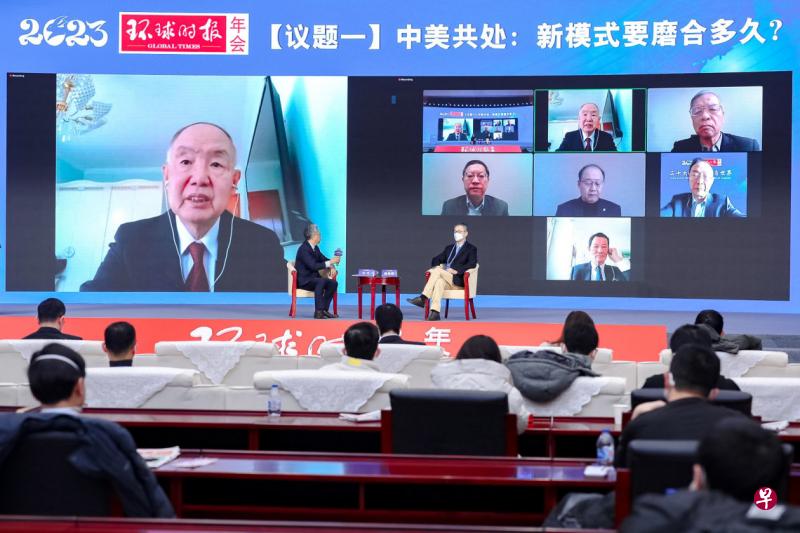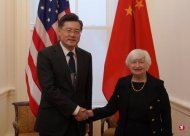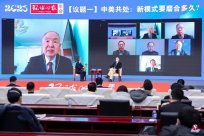
Beijing Special Commissioner
Major General Yang Yi of the Chinese Navy believes that the number of conventions in China and the United States is to work hard to prevent conflict competition.
Sino -US relations have fallen into the model of "unreasonable and disagreement, but have to deal with each other"; Major General Yang Yi of the Chinese Navy judged that the relationship between China and the United States would not be more stable when the balance between the two countries became balanced;Now China and the United States can only "change space in time."
China and the United States have gradually resumed dialogue after the face -to -face meeting of the two countries' heads of state held in November. Some analysts believe that Sino -US relations have entered the ease period, and the relationship may stabilize.However, Yang Yi pointed out at a forum on Sino -US relations on the Global Times Annual Conference on Saturday (December 17) that unless a major event similar to 911 occurred in the world and caused greater threats to the United States, the United States regarded China as the most important strategyThe strategic positioning of competitors will not change in a short time.
Yang Yi believes that the number of conventions in China and the United States is to work hard to prevent conflict competition.But for how to install the protective bar, China and the United States are "sang and north."China advocates strategically abandon the Cold War thinking, while the United States advocates taking crisis control measures at the technical level.
Yang Yi said that the relationship between competitive state must be stable. In addition to based on common threats and common interests, it is more important to be the overall balance between the strength of both parties.Therefore, when the balance between the two countries is balanced, it may be the time when the relationship between the two countries can be relatively stable.Yang Yi believes that this process will be as long as 10 years.
Yang Yi concluded that the United States does not allow China to develop, and there is no other way. For China and the United States, "change the space in time and see who laughs to the end."
Huang Renwei, Executive Deputy Dean of the Global Governance Research Institute of Fudan University, who attended the same forum, was vigilant. The Russian and Ukraine conflict had a significant impact on Sino -US relations, leading to a significant increase in geopolitical factors in Sino -US relations.
The United States listed China as a "strategic competitor" during Trump's ruling period; US Secretary of State Brosky said that China in May said that China constitutes "the most severe long -term challenges" for international order; the national security strategy report released by the United States in OctoberFurther positioning China as "the worst geopolitical challenge".
Huang Renwei said that the geopolitical factors, for the first time mentioning such an important position in Sino -US relations, are worthy of attention.
China and the United States have "Ukrainian traps"
on the issue of Taiwan and the United StatesHe believes that the Russian -Ukraine conflict has a warning of China and the United States. China is worried that the Russian -Ukraine trap will repeat the issue of the Russian and Ukraine. The United States claims that China will become the second Russia and turn Taiwan into Ukraine.Both sides have the "Ukraine trap" problem on the Taiwan issue.The United States now severing weapons to Taiwan seems to be to learn from Ukraine's lessons, thinking that "the sooner the preparation, the better", which has increased the risk of geopolitical between China and the United States.
Huang Renwei pointed out that China still needs to pay special attention to the United States' Indo -Pacific Strategy to further concrete. China's "crossing a big step out" in the Middle East is also very nervous.The uncertainty of US relations, the two sides are also worried that this will lead to greater confrontation.
Huang Renwei said that now that China and the United States are consciously not in the direction of confrontation, "but I suspect that the degree of danger will not be alleviated."
The US Department of Commerce on Thursday (December 15) included 36 Chinese technology companies in the export control "physical list", which made some public opinion worry that the pace of China and the United States' economic and technological decoupling is accelerating.
In this regard, Yang Xiyu, a researcher at the Asia -Pacific Research Institute of the China Institute of International Institute of International Issues, and He Weiwen, a senior researcher at the Chongyang Financial Research Institute of Renmin University of China, all pointed out the importance of the Chinese chip market to the United States.Yang Xiyu believes that as long as China can do his own affairs, it must be the United States, not China, not China.
But Fang Ning, a researcher at the Institute of Political Science of the Chinese Academy of Social Sciences, reminded that the key depends on the external world, especially the West, whether it will form a consistent attitude and action with the United States on the issue of science and technology.It's serious. "
He said that if the United States and other countries have blocked China in the high -tech field, China can only lag behind the world, and the distance will become bigger and bigger. "This is not a problem that can be solved by self -reliance."




